Ata-ul-Haye Nasir, Ahmadiyya Archive & Research Centre
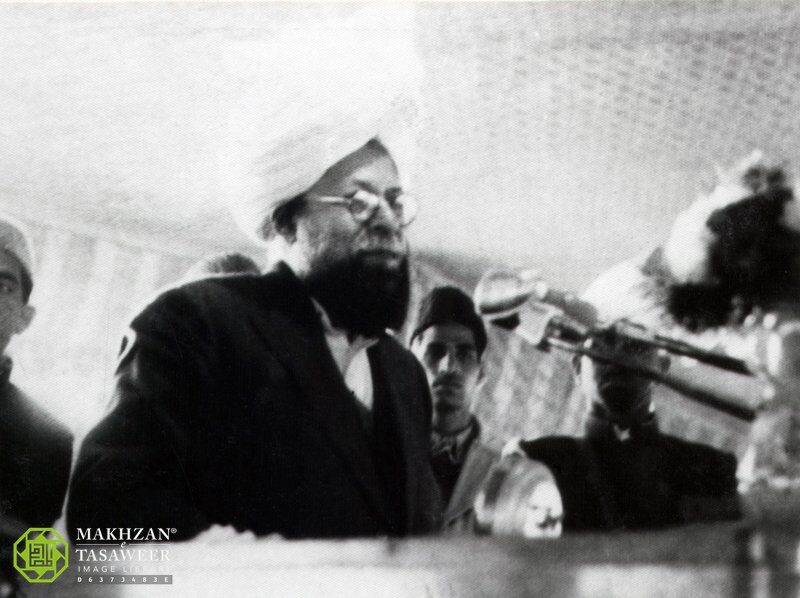
The background of Simla Conference
On 14 June 1945, the Viceroy of India, Lord Wavell presented a scheme – the Wavell Plan – for India’s political future in which the formation of a new Executive Council was proposed.
In order to discuss this plan with the Indian leaders, Lord Wavell called a conference in Simla, known as the Simla Conference, which continued from 25 June to 14 July 1945.
In regard to the purpose of the Simla Conference, Dr Ayesha Jalal states:
“On 25 June the Viceroy opened the Simla Conference. Its aims, as he explained, were quite modest: it did not intend to settle matters but rather to pave the way for a settlement.” (The Sole Spokesman: Jinnah, the Muslim League and the Demand for Pakistan, Sang-e-Meel Publication, p. 129)
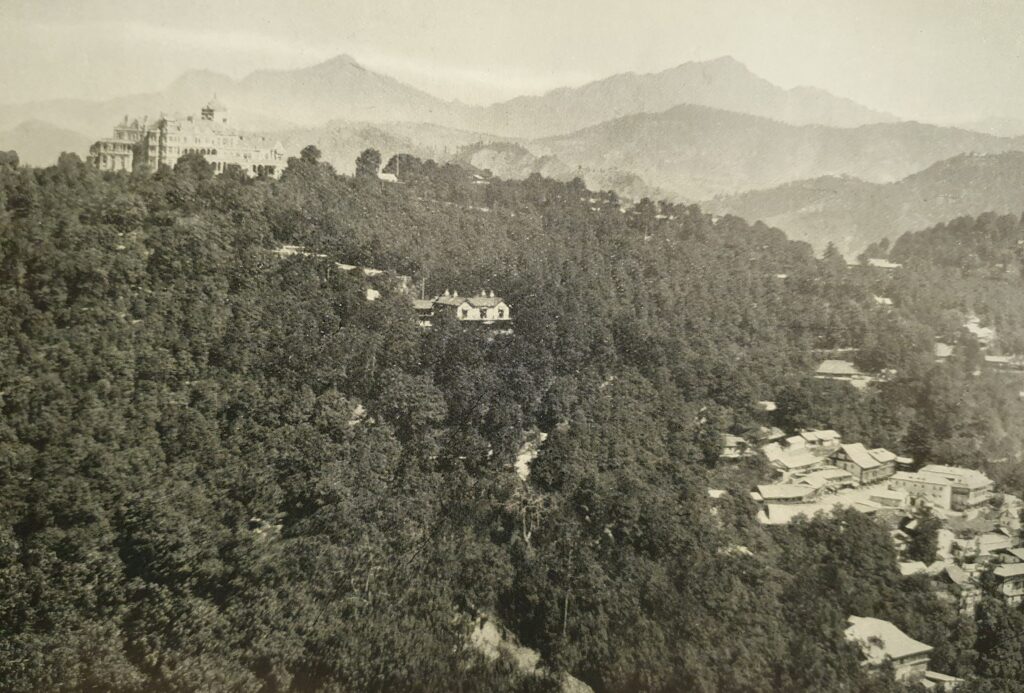
Hazrat Musleh-e-Maud’sra guidance prior to the conference
Just three days before this conference – during his Friday Sermon on 22 June 1945 – Hazrat Mirza Bashiruddin Mahmud Ahmad, Khalifatul Masih IIra had advised the Indian leaders to accept this proposal of the British government, which would ultimately lead India to its freedom. He said:
“It would therefore be a most unfortunate and dark day for India if her sons deliberately turn their backs upon such a proposal. I, for once, find it impossible to comprehend how Indian leaders, many of whom are men of calibre and deep vision, can fail to perceive that if they have every hope and confidence in their ability to win freedom, notwithstanding the fact that the entire power now lies in the hands of the Britisher, they should have no reasonable ground for misgivings after 90% of the power is transferred to them. […]
“There can be no possible shadow of doubt that whatever rights we do get, no matter whether they are large or small, it is emphatically in our interest to grasp them firmly and turn them to our advantage. By doing so we shall be bringing the day of India’s Independence nearer. I am firmly of [the] opinion that we should gladly accept this proposal. We should do so not for the sake of doing a good turn to Great Britain, but for the good of our own souls, and for the good of the coming generations of our children. […]
“No amount of empty words, no amount of pious exhortations, no amount of fiery political speeches can set in motion this surge of the soul on a country wide scale. To awaken a real hunger for freedom, we must give the masses some fore-taste of the joys of freedom – which we can do most effectively only by firmly grasping the power, now being put into our hands.” (The Review of Religions, Vol. 44, pp. 107-110, July 1945)
The original Urdu of this sermon was published in Al Fazl on 23 June 1945, whereas its original Urdu and English translation was given to various leaders in Simla, where they had convened for the conference. The leaders who were given the sermon’s Urdu and English text included Maulana Abul Kalam Azad, Quaid-e-Azam Muhammad Ali Jinnah, MK Gandhi, Khan Abdul Jabbar Khan, Mr Hussain Imam, Mian Iftikharuddin, Pandit Govind Ballabh Pant, Rajkumari Amrit Kaur, BG Kher, Ravishankar Shukla, Sri Krishan Sinha, etc. (Al Fazl, 27 and 28 June 1945)
This sermon had so much impact that even a staunch opponent of the Jamaat, Maulvi Sanaullah Amritsari wrote:
“The passion to free 400 million Indians from slavery – which is evident from this speech of Khalifa Ji [Hazrat Khalifatul Masih IIra] – cannot be found even in the speech of Gandhi Ji.” (Ahl-e-Hadith of Amritsar, 6 July 1945, p. 4)
The failure
Unfortunately, the Indian leaders could not agree on this proposal, and thus this conference failed to give any positive results.

While speaking to the final session of the conference, Lord Wavell said:
“I wish to make it clear that the responsibility for the failure is mine. The main idea underlying the conference was mine. If it had succeeded its success would have been attributed to me, and I cannot place the blame for its failure on any of the parties. […] I propose to take a little time to consider in what way I can best help India after the failure of the Conference. […] Do not any of you be discouraged by the setback. We shall overcome our difficulties in the end. The future greatness of India is not in doubt.” (The Manchester Guardian, 16 July 1945, p. 6)

On 8 August 1945, the Secretary of State for India, Lord Pethick-Lawrence circulated a note dated 15 July 1945 from the Viceroy of India Lord Wavell, in which he provided an account of this conference. He stated:
“The statement in Parliament and my broadcast on the 14th June were well received on the whole. It was soon clear that most educated Indians were in favour of the proposals being accepted. […]
“Gandhi, stimulated, I think, by Patel, complained that we had for the first time distinguished between ‘Caste’ and other Hindus. He hinted at what was to be the main argument of the Congress at the conference – that the Congress is a national and not a communal party. He thought the proposals were far from clear about India’s independence. […]
“The immediate cause of the failure of the conference was Jinnah’s intransigence about Muslim representation and Muslim safeguards. […] Their fear that the Congress, by parading its national character and using Muslim dummies, will permeate the entire administration of any united India, is real and cannot be dismissed as an obsession of Jinnah and his immediate entourage.
“The failure of any political move narrows the field for future negotiations. […] Gandhi’s final comment to me at the interview when I told him of the failure was that His Majesty’s Government would have to decide sooner or later whether to come down on the side of Hindu or Muslim, of Congress or League, since they could never reconcile them. A discouraging comment but true under present leadership.” (PETHICK-LAWRENCE, Frederick William. The Simla Conference: Memorandum by the Secretary of State for India. C.P. (45) 97. [online]. London: Great Britain. Cabinet Office. 08-08-1945. Accessed 19 June 2022. Available at https://www.cvce.eu/s/lq)
“Although the Simla Conference failed, it opened a new chapter in the political history of India.” (Partition of India: Legend and Reality, by HM Seervai, Emmenem Publications, Bombay, 1990, p. 35)
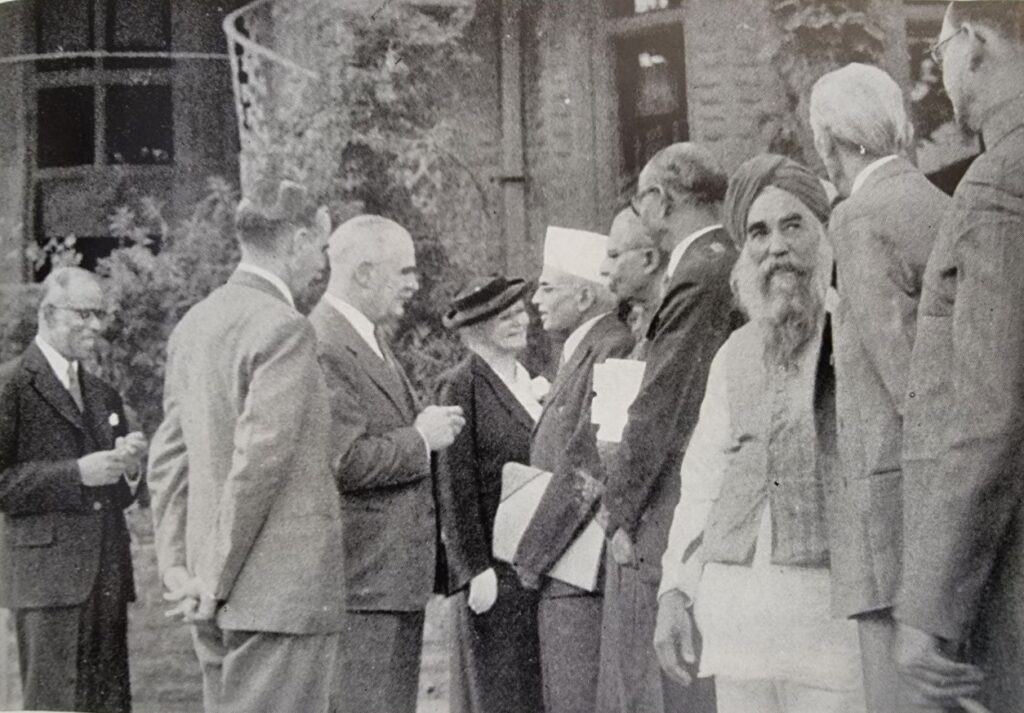
Hazrat Musleh-e-Maud’sra response to the failure of Simla Conference
While commenting on the failure of this conference – during his Friday Sermon on 20 July 1945 – Hazrat Khalifatul Masih IIra said:
“During the recent days, Indian political leaders convened in Simla and dispersed after being unsuccessful [in reaching any settlement]. As far as the disagreement is concerned, […] it can be understood that they were unable to reconcile with their rivals, just for maintaining the pitch of their fundamentals, though it was a matter of concern that they disseminated without any success.
“It was unfortunate for India that while freedom was at its doorstep, its major leaders did not unite due to their trivial disagreements, and India continued to remain enslaved. But the moral conduct demonstrated after the Sulh Conference [Simla Conference] was even more painful than this failure.” (Al Fazl, 30 July 1945, p. 1)
Huzoorra went on to mention the disrespectful behaviour shown by the Hindu and Muslim press towards the leaders of both communities and the targetting of Jinnah and Gandhi specifically.
Huzoorra said:
“After the usage of such [disrespectful] means, I do not think that we can hope for any mutual agreement [between these communities]. From these acts, it is visible that their hearts desire to continue the disagreement. Otherwise, they were supposed to feel regret and guilt after this failure to such an extent that everyone should have noticed that India is eager to get freedom. But, instead of feeling regret, pain and remorse upon this failure and aiming for the real objective, they are disputing petty things and maligning each other. […]
“In such a situation, we can only pray to Allah the Almighty that may He remove this trouble from our country. The biggest problem is moral corruption and the second problem is that people do not offer those sacrifices which are required to achieve great objectives.
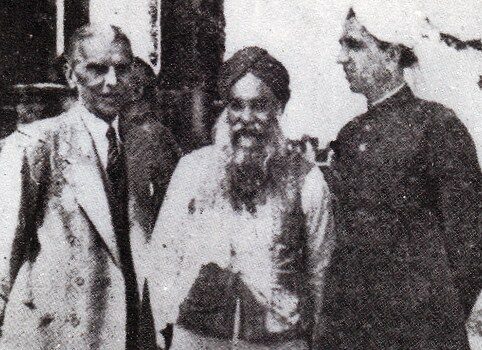
“As far as I have pondered, both sides have been presenting contradictory points during this dispute, meaning that the Congress – considering its fundamental principles – should not have said those things which they expressed [during the Simla Conference], and some of the points presented by the Muslim League on that occasion, were also against the principles. Similarly, the prime minister of Punjab also should not have presented the claim that he expressed there.
“This disagreement depicts that the true desire for freedom has not yet inculcated [in their hearts], or everyone thinks that ‘I can achieve my objectives even by neglecting my rival’s demands, and thus, I do not need to step forward to reconcile.’ […]
“As far as I could understand from the speeches of [different] leaders, they also feel there are some dangers in the future, but still they are not ready to give even an inch to their neighbouring community, and are ready to let the whole country remain in the hands of foreign nations.
“Therefore, I advise members of the Jamaat to pray fervently during these delicate times. As far as politics are concerned, we have no interest in politics, but the coming events will not only impact politics but religion as well. Therefore, our only interest in these political matters which have no direct relationship with us is because they will consequently impact religion.
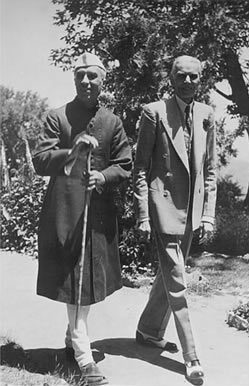
“Thus, our Jamaat should especially pray during these days and ask Allah the Almighty with humbleness that: ‘O God, it is out of our power to face the coming dangers because they are in relation to politics and we do not interfere in politics. […] Moreover, those who are associated with these matters have become so rigid-hearted that they are sacrificing great objectives for some petty issues. O Allah, either reform their hearts or bring some other leaders who move this country towards peace and conciliation.’ […]
“At first, we should pray that may Allah the Almighty enable those who have served the country to an extent [in the past], to create an atmosphere of conciliation and peace instead of depriving the country of freedom, for some trivial issues. But if their hearts cannot be reformed, then the country’s freedom is the foremost matter […] and thus we should pray to Allah the Almighty to bring in front such leaders who […] strive to create peace and conciliation within the country.” (Ibid, pp. 1-2)
In his article, dated 21 October 1945, Huzoorra said:
“The policy of myself and Jamaat-e-Ahmadiyya has always been that there should be a mutual conciliation between the Muslims, Hindus, Sikhs and all other communities, which could instil a spirit of love, harmony and cooperation within the country. But sadly, we have been unsuccessful in this regard until now.
“Simla Conference was a rare opportunity, but it has been lost, and some individuals – by prioritizing their personal enmities and objectives – raised such questions which have caused a delay of several years in the country’s freedom. […]
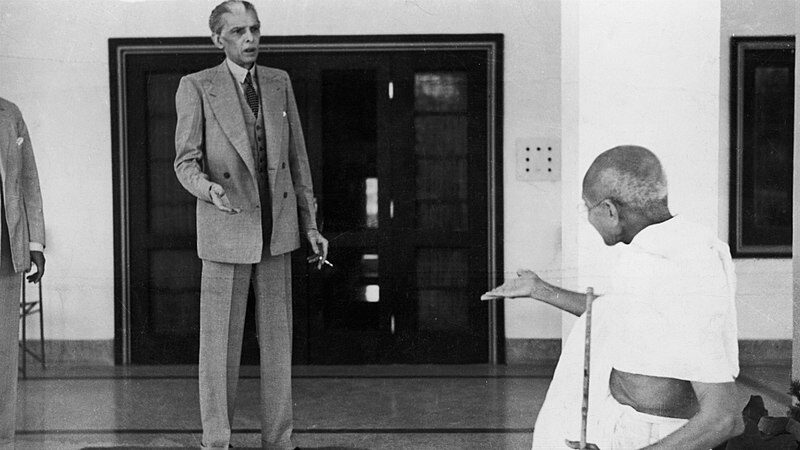
“As far as I have pondered, the main question is about the disagreement between the Muslims and Hindus. It does not mean that the interests of other communities can be neglected, rather I mean to say that the issues of other communities could easily be settled once this [Hindu-Muslim] conflict is solved.
“The most crucial question is about the conciliation between the Muslims and Hindus, and this issue is far older than the issues of Pakistan and a United India. In fact, the real problems are those which have turned the attention of the Muslims towards [their demand for] Pakistan and the motives behind the thoughts of a United India are also the same problems that have been the reason behind denial of the Muslim demands. […]
“An opportunity arose in Simla when the Muslim League and the Congress – representing the sentiments of the Muslims and Hindus respectively – had gathered at one place, but alas, that gathering has led to an ever greater rift.” (Al Fazl, 22 October 1945, p. 1)
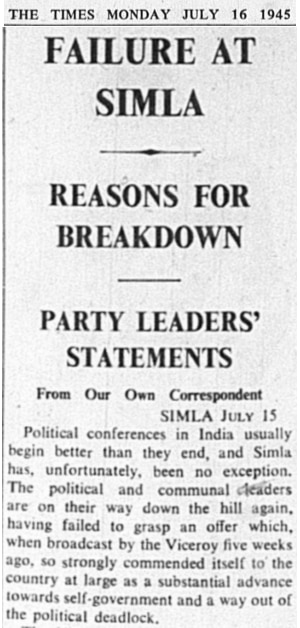
It is evident from Huzoor’sra words that he desired the political unrest to be settled and leaders needed to sacrifice their trivial matters for a bigger cause – the independence of India.
At the end, I will present a comment by Major Wyatt in regard to the deadlock between Indian leaders and the Government, which he made in the British parliament on 20 August 1945, that showed the need for conciliation was felt in the government circles as well:
“A nation ruled by another nation is a nation with a cancer in its soul. It can think of nothing but its independence, and it will not cooperate wholeheartedly with the Government of the country that rules it, however beneficent the measures of that Government may be. […]
“[This] deadlock cannot be allowed to go on. If it is continued, and if in six months from now it is unresolved, I am quite certain there will be greater trouble in India than at any time since the Mutiny.
“Indians, like the people of this country, are looking with great hope to this new Labour Government, and as an earnest of good faith, there are a number of things that could be done straight away, simple administrative things. We could arrange to hold elections immediately, so that we could find out the true state of the contesting parties in India.” (Hansard, HC Deb, 20 August 1945, Vol. 413, https://hansard.parliament.uk)
Related Content
- Hazrat Musleh-e-Maud’s services to the Muslim cause: Guiding Muslims of the Indian subcontinent amid religious and political conflicts
- Hazrat Musleh-e-Maud’s response to the Shuddhi movement and the Jamaat’s relentless services for Islam
- The Simon Commission, First Round Table Conference and Hazrat Musleh-e-Maud’s valuable guidance
- Freedom is the birthright of everyone: Hazrat Musleh-e-Maud’s guidance regarding India’s independence and partition
- The Wavell Plan and Hazrat Mirza Bashiruddin Mahmud Ahmad’s (ra) call for peace and India’s freedom
- The Cabinet Mission, 1946: Its background and Hazrat Mirza Bashiruddin Mahmud Ahmad’s (ra) guidance
- The deadlock over Interim Government and Constituent Assembly for India: Its background and Hazrat Mirza Bashiruddin Mahmud Ahmad’s (ra) guidance
- May India and Pakistan live amicably: The Partition of India, 1947 and Hazrat Mirza Bashiruddin Mahmud Ahmad’s heartfelt wish

